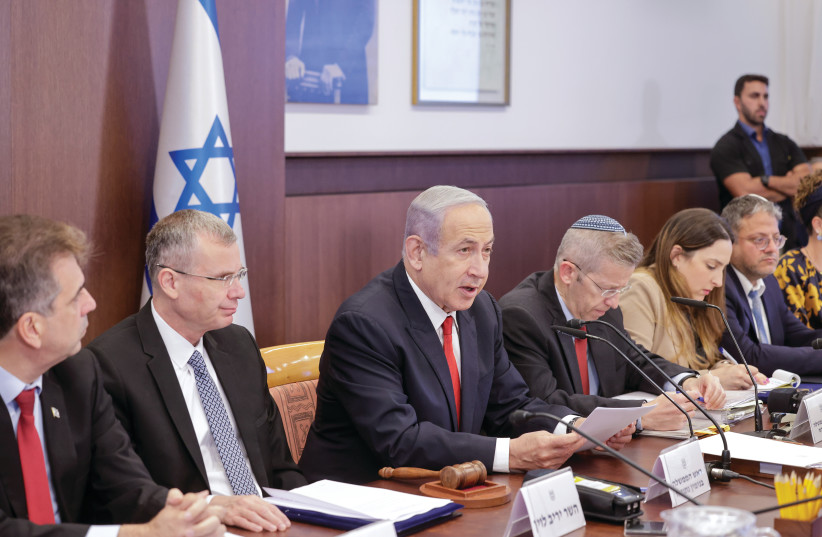Were we to ask, “What has been the most controversial and divisive issue of the current government?” I am sure most Israelis would say the judicial reforms and the protest movement born in response to them.
There is a second arena that we cannot overlook, and that is the Jewish fabric of Israeli society – instead of it being a source of solidarity, it is a source of division. The tragic part is that the government that claimed to put the country’s Jewish identity at the beating heart of its agenda, is implementing policies pushing people away from their Judaism, even within the religious community.
About six months ago, a new government was established in Israel. This government carried two key flags – one being a full-throated right-wing coalition, and the other that puts Jewish identity at its heart. In a world of identity politics, there is even a name for this – “The Faithful Bloc” encompassing the Likud, The Religious Zionist Party with its two satellite parties, and the two haredi parties.
The importance of this political brand and the synthesis of two key agendas is in creating an implied political reality – that those within the coalition are right-wing and in favor of strengthening the country’s Jewish identity, and those who are not are exactly the opposite.
At the heart of this political coalition, is The Religious Zionist Party. This is formed from a mini-coalition of three parties that ran a joint list in the general election: Finance Minister Bezalel Smotrich’s Religious Zionist Party, National Security Minister Itamar Ben-Gvir’s Otzma Yehudit party, and Deputy Minister Avi Maoz’s one-MK Noam party.

Although they make claims to represent the entire religious Zionist community, and occasionally even the Masorti (traditional) Israelis, the reality is somewhat more complex.
In contrast to the priorities set out by Prime Minister Benjamin Netanyahu in the first days of the new government, the reality has been very different. Iran and other security issues seem to be on the back burner, governance and the fight against crime are in a serious downward spiral, and instead we have seen the aggressive handling of the legal system.
But the same aggressive approach is being employed to handle the issue of Judaism and the relations between state and religion. It may be that the coalition aspires to make Judaism center stage, but large parts of the population see it as a religious minority shoving its Jewish values down their throats.
One might assume that this would only have a negative effect on secular Israelis, more obviously alienated by coercive policies on religion and state. However, research we carried out at The Institute for Jewish and Zionist Research paints a different picture.
Religious Jews are against religious coercion
In a recent survey of religious Zionist and traditional Israelis, a majority agreed that the government is actually alienating the population from its Jewish identity. While we can’t easily associate a specific policy decision or legislative proposal that has triggered this response, we do know from previous polls that large parts of the religious, and certainly traditional population, are against religious coercion.
With Avi Maoz’s influence over the education system, increased powers for the Rabbinic courts, and dramatic legislation reinforcing the power of the State’s monopoly over nationwide Rabbinic appointments and policy, it is not a surprise that the government is less seen as the government of Jewish identity, and more as the government of religious coercion and alienation.
With this in mind, we can consider two other findings of the poll.
In his weekly column (Yediot Aharonot, June 30) prominent political commentator Amit Segal observed that Smotrich’s Religious Zionist Party represents a very small part of the overall religious Zionist community.
In his column, (which we quoted from in our poll question) he claimed that not only do they not represent the whole community, but it may not even represent more than a subsection of the settler movement – “from Hebron and Yitzhar, but not Gush Etzion or Beit El, and barely Givat Shmuel.”
In our poll, we asked religious and traditional Israelis if they agreed, and across the board (from the most liberal to the most conservative), there was a clear majority who agreed with the statement. This is a remarkable piece of data, especially given that we know that nearly half of Israel’s religious Zionists voted for Smotrich/Ben-Gvir/Maoz.
This leads us to the second interesting find of the poll. As of today, over a fifth of those who had voted for them just last November would, if there were elections today, not do so again. While we know that this is not enough to create a new political map if there were a serious sectoral alternative for religious Zionists to vote for, that peeling off may grow.
Half the members of the government are religious or Haredi making all the more remarkable its feat of causing so much harm, weakening Israelis’ sense of connection and affiliation with its Jewish character. What turns this feat into a tragedy is that this is not in spite of their policy, but because of it.
The government has been accused by many of undermining the foundations of Israel’s democracy, but it is also causing critical damage to the way Israelis feel about Judaism and the Jewish identity of the country, in the deepest sense of the word.
The writer is a founding partner of Goldrock Capital and the founder of The Institute for Jewish and Zionist Research. He is a former chair of Gesher, World Bnei Akiva, and the Coalition for Haredi Employment.
